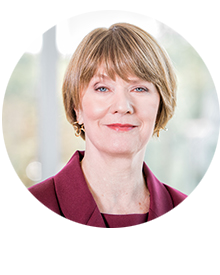We Dare to reimagine nursing education

How do we bring a top-ranked nursing education into the digital space and make the Michigan difference more accessible?
The University of Michigan School of Nursing’s new online master’s programs are student-centered and faculty-driven, distinguished by an enhanced focus on connectivity. Students now have the opportunity to earn their MSN in the Primary Care Family Nurse Practitioner, Adult-Gerontology Primary Care Nurse Practitioner and Leadership, Analytics and Innovation specialties through a newly developed digital education curriculum.
These specialty programs were identified for development in a digital framework because they cross the spectrum of nursing education, from the highly clinical PCFNP and AGPCNP programs to the data-driven Leadership, Analytics and Innovation specialty, which prepares nurses to thrive in executive leadership roles.
Through an innovative “virtual school,” students can plug in to the U-M community no matter where there are, seamlessly connecting with renowned nursing faculty and the wide array of resources offered at world-class research institution.
“Our faculty are poised to do this, and they’ve helped push us in this direction,” said U-M School of Nursing Dean Patricia Hurn. “They want to reach more students and make a bigger impact, and that’s a huge advantage we have in making these programs unique.”
As Hurn explains, bringing the on-campus experience online was essential to provide an uncompromising education that delivers U-M School of Nursing excellence to students throughout the state and across the country.
“The Michigan difference will continue in our digital education just as it does in our residence education,” Hurn said. “The person who earns their master’s in residence and the person who earns it digitally will have the same quality experience, with the same access to our talented faculty and the same connectivity to the larger university community.”
The programs employ cutting-edge digital education methodologies such as storybooking, animation, simulation and more in order to maintain the rigorous didactic and clinical instruction offered on campus. By providing innovative training in flexible learning environments, the school aims to address the growing demand for high-quality digital education among graduate nursing students across the country.
“Master’s degree nursing students need more than what’s been offered right now,” said Hurn. “We’re doing things that make our digital education distinct and in ways that haven’t been done before at a top-tier nursing school.”
For students who want to earn an in-demand degree in a research-intensive environment, these programs present a unique opportunity to capitalize on the school’s strong connections with esteemed clinical communities and develop distinct skills that will set them apart.
“These programs will allow us to engage many more people to be Michigan nurses, and that is our ultimate goal. We think Michigan nurses are the best, and we want them everywhere.”
“The person who earns their master’s in residence and the person who earns it digitally will have the same quality experience.”
— Dean Patricia Hurn Ph.D., RN, FAAN
U-M School of Nursing Dean






